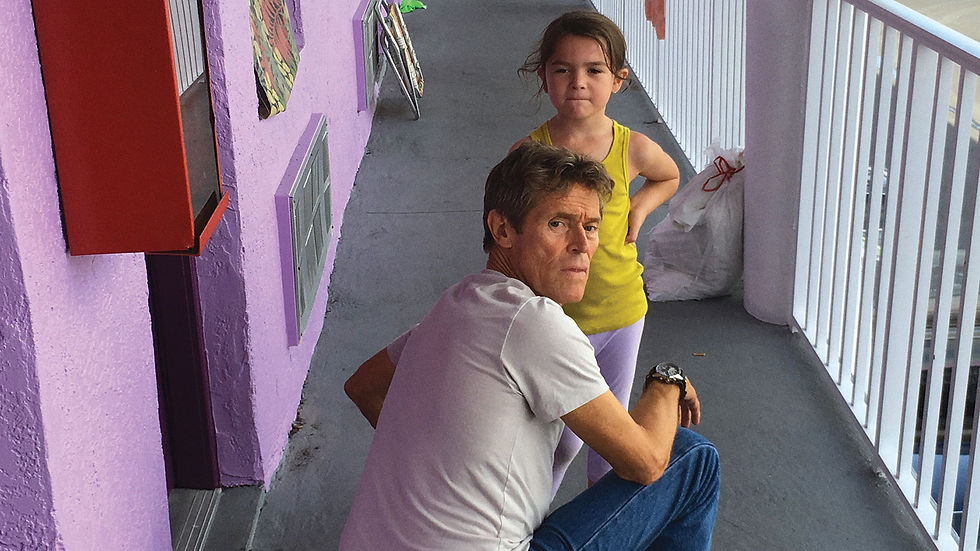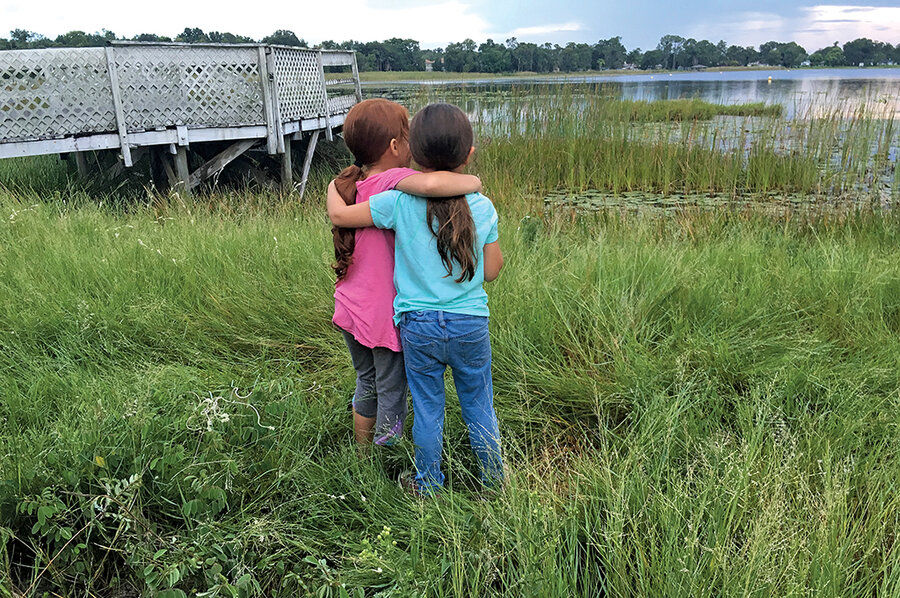'I Can Always Tell When Adults Are About To Cry' Nostalgia VS Cynicism In The Florida Project
- Fiona Craughwell
- Mar 13, 2022
- 5 min read
It’s everyone's favourite time - Fi’s Favourites - and this week, we are looking at The Florida Project (TFP). For anyone who has come across the highly praised Tangerine and the more recent Red Rocket, TFP also comes from the brain of Sam Baker. It is an A24 production, and when you say that these days, it brings a set of expectations with it. In keeping with A24’s reputation, TFP packs quite a punch.
TFP centres around the life of six-year-old Moon, her Mother Halley, the motel manager they live in, Bobby, her friends and the other residents of the complex. So close to the magical world of Disney yet so far away. Moonee and her mischievous friends cause havoc around the complex and the neighbouring ones. While not the traditional image of what we think a mother should be. Halley has the same love for her daughter as any mother and struggles to take care of her. Bobby’s frustration with the kids’ antics is merely a front for a man that is rooting for his tenants but can only do so much.
I have recently noticed a thread emerging in my writing, although my avid readers and true fans may have noticed already. What I seem to have identified in films that are just a cut above the rest is their grounding in a profound reality. TFP could almost be from the library of Films With Fi favourite Fredrick Wiseman, captured by a camera just left to observe, and, in a way, it almost is.

Baker filmed in a real motel complex, so most of the residents were genuinely staying there. One of the first main characters, Scooty, was a boy who was staying there with his mother. Everything around the motel, including the helicopters flying overhead so close to the motel, is real. Much of the dialogue is improvised and you can tell this, especially with the kids. They are simply talking and interacting the way kids so. Conversations in the schoolyard would sound no different to the ones in this film. Besides Defoe, most of these performers are first-time actors, not that it shows.
A film about a struggling child living in a very adult world is not a new concept. We have seen, and no doubt will continue to see, this narrative time and time again. TFP is powerful and is as powerful as any biopic or documentary. Like a lot of A24 productions, a deep grounding, in reality, makes their films so emotive. This sense of reality is largely due to the reasons above, but also due to so much more: the characters, the writing, the style and how the story is presented to us.
Moonee is as childish and as grown-up as her mother. She is caught between two worlds. Her actions and her words gently and seamlessly move between her genuine childish notions and a phrase she heard from her mother or another adult. For me, it is Halley’s character that makes TFP stand out. We are used to seeing the dedicated, burnt out, hardworking mother nearly killing herself every day just to keep her child going or the more neglectful mother, not grown up enough to care. Halley is a caring mother, but at times is more like a child than Moose is. She is stuck between wanting to do the right thing and not knowing what that is or how to get there. Her maternal nature shines through at so many moments, but so does her naivety. Sometimes she seems more like a sister than a mother.

Stylistically, if I had to describe TFP, I would say it is as if Wes Anderson and Andrea Arnold had a filmic love child. Much like an Anderson classic, we are kept at a certain distance so as to be able to see the whole world and the characters moving within it and then we are gradually and slowly allowed in for a closer look. I was very much reminded of The Royal Tenenbaums, where we look at a complex and interconnected world. Of course, the difference here is that we swap quirkiness for gritty, and often harsh, reality. The bright lighting, the colours, the references and the resemblance to Disney World tell us that this is a childish world. They live in a purple castle, something so childish yet so adult at the same time.
Here, we are not just looking at the world like Anderson does. We are looking at this world as society likes to see it; not too close and glossed over by a bright coat of paint. Never seeing how bad things really are, TFP is a privileged look into a world that nobody really wants to see. Nobody likes being up close and personal with the flaws in their society. It makes us feel guilty and uncomfortable and it should. It is the simplicity of day to day life that is so effective; the small details of a complex life very different to our own.

There are two moments in which Moonee’s seemingly simple childhood, one that we all feel nostalgic for at one time or another, take on particular power. One is the bath scenes. Slowly we start seeing these recurring scenes of Moonee playing with the toys in the bath. Of course, it seems like an innocent play at the start, but gradually Baker reveals the dark reality behind the innocence. Then there is the discussion between Halley and Moonee at the buffet. Moonee speaks looking into the camera; at us. This is one of the first moments in which we truly get to look and listen to Moonee. The stage is hers and she is in a grown-up world, not surrounded by her friends. She is so adult and so child-like at the same time, clearly repeating phrases she has heard from the adults around her. It is these two elements that we see in Moone. She is caught between two worlds.
The film’s final moments are absolutely some of the most emotive moments in cinema I have ever seen. The editing itself is genius. For half an hour, we are on the edge of our seats. There is no tense music, no distractions, just clever editing. We cut between Halley, Moonee and Bobby continuously. We are waiting for something awful to happen, something immediate, but, of course, something awful is already happening. The build-up is Moone’s build-up to a devastating realisation that her life may never be the same again.
Moone’s age shows when the reality of what’s happening becomes all too much and we watch on, unable to comfort a child that so desperately needs it. For me, the film should have ended when Moonee was struggling to find the words she needed to say, but I see what Baker was trying to do and it is clever; looking for that Hollywood ending in ‘the happiest place on earth’.
Baker’s look at the harsh reality of American life is very much how society looks upon it, as something they would rather not see, but if they have to, the colours must be made brighter so that things don’t seem as bad as they truly are.






Comments